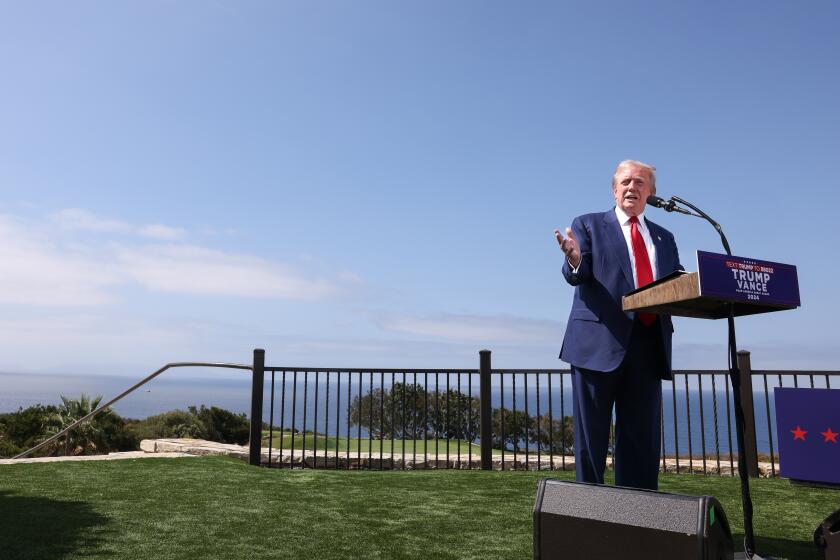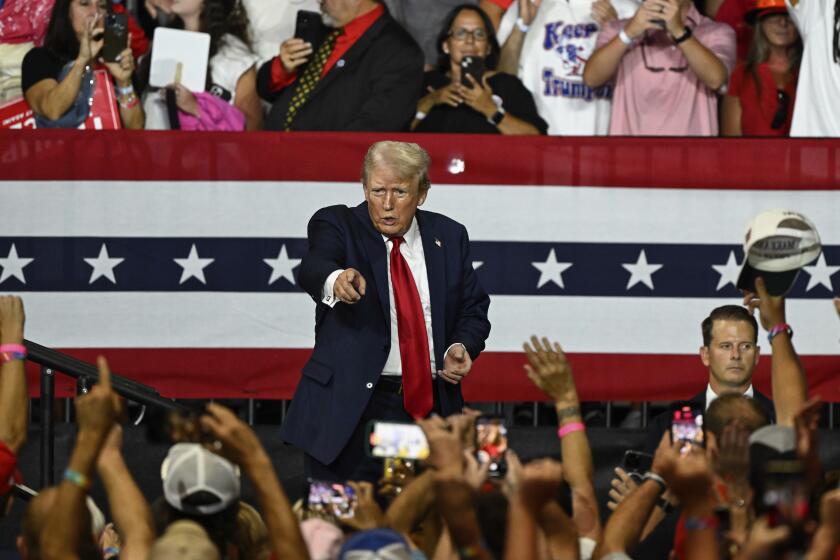Bush who? Republican contenders stay mum
The Republican presidential candidates are giving President Bush the silent treatment.
Consider their remarks earlier this month before a convention of conservative activists whom Bush had once carefully cultivated and whose support helped propel his two successful presidential campaigns.
As one candidate after another addressed the annual conference of the American Conservative Union, which drew 6,300 participants, Bush was the man who was not there. Not only did he not speak to the convention, he was barely mentioned when those vying to succeed him addressed the conservative cadres.
The Republican candidates’ distance from Bush reflects a basic political reality: They are seeking to replace a GOP president who nearly twice as many people believe is taking the country in the wrong direction as think he is pursuing the right course, according to recent polls. Bush also is singularly identified with a war that, surveys have found, a majority of the country thinks was not worth fighting.
The cold shoulder Bush is receiving is a far cry from the not-so-distant past.
Speaking a year ago to the Southern Republican Leadership Conference in Memphis, Sen. John McCain of Arizona as much as endorsed a third term for Bush. He mentioned him, or spoke glowingly of his policies, 11 times and suggested that those taking part in a presidential straw poll should “just write in President Bush’s name.”
At the 2004 Republican National Convention in New York City, former Mayor Rudolph W. Giuliani recalled that in the chaos after the Sept. 11 attacks, he turned to his police commissioner and said: “Thank God George Bush is our president.”
In his convention speech, he added, “I say it again tonight.”
Giuliani, who leads in the Republican race in recent polls, does not repeat the 9/11 anecdote these days; he has singled out a different politician for praise.
He referred to President Reagan 12 times at the conservatives’ convention. “One of my heroes,” he said. His references to Bush were few and brief.
Asked for further comment, Maria Comella, deputy communications director of Giuliani’s presidential exploratory committee, declined to go beyond an e-mailed statement that in his public appearances the former mayor “praises President Bush for being a steadfast leader against terrorism.”
McCain’s campaign, responding to a request to detail his recent references to Bush, replied with 13 instances in which he spoke of the president -- most in response to questions.
Former Massachusetts Gov. Mitt Romney, one of several GOP presidential contenders who trail Giuliani and McCain in the polls, delivered a warmly received speech at the conservatives’ convention in which he praised Reagan -- and made no direct mention of Bush.
He did, however, offer a back-door criticism of Bush’s stewardship of the Iraq war, saying, “We were under-prepared and under-planned and under-managed and undermanned.”
Spokesman Kevin Madden said Romney’s remarks reflected his priority on introducing himself and his positions. “It’s very important that we talk about his ideas, his record, his vision for the future, because we face the challenge of not being well-known,” Madden said.
Still, how to deal with Bush and his record -- most obviously, the Iraq war -- is sure to prove a sensitive issue for the candidates as their campaigns play out.
“Rally-round-the-president doesn’t work” in the current political climate,” said Dick Bennett, president of American Research Group, a New Hampshire polling firm that conducts national studies of the electorate.
“The only thing they can do is criticize, and Republicans don’t like to criticize other Republicans,” he said.
Listing the issues that consistently come up as voter concerns in his surveys -- the war, healthcare, education, the economy and rising gasoline prices -- he added, “What they need to say is, ‘I’m going to lead you out of this.’ They’re going to have to do that, but they’re not doing it now.”
james.gerstenzang @latimes.com
More to Read
Get the L.A. Times Politics newsletter
Deeply reported insights into legislation, politics and policy from Sacramento, Washington and beyond. In your inbox three times per week.
You may occasionally receive promotional content from the Los Angeles Times.










